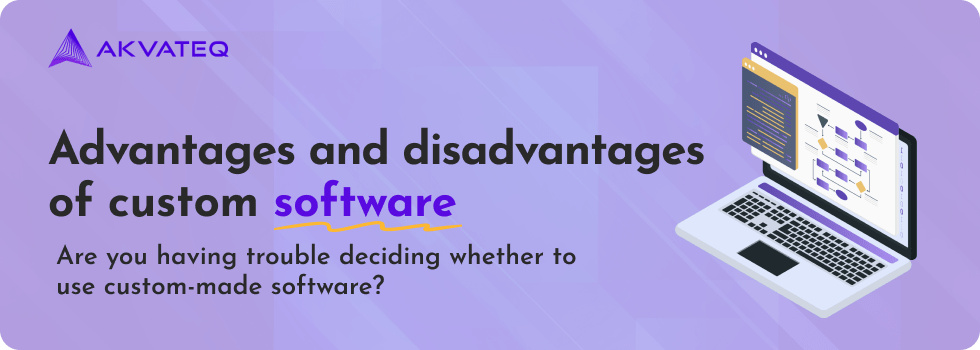Are you finding it difficult to choose between using software that’s specially made just for your needs or using software that’s already built and available for everyone for an important task in your organization? Choosing between these two options can be really tough for any manager or leader. Both custom software and ready-made software require a lot of time and money, and they’ll impact your company for many years. You definitely don’t want to make a mistake with this important choice. To decide, you need to understand the benefits of custom software and ready-made solutions and think about their pros and cons. Custom software can be a good choice if you find the right people to create flexible solutions that are easy to use and maintain. On the other hand, ready-made software saves you time and money at the beginning. Several factors can help you figure out which option is best for your organization. Some important things to think about are how hard the job is, how big your organization is, what you want to do in the future, and if you can afford it. Before you decide, it’s crucial to know the good and bad things about each choice and when it’s best to use custom-made software or ready-made software.
Lots of companies have to decide whether to make their own special software or buy ready-made software. Making your own software is unique to your needs, but ready-made software is cheaper and faster. This choice shows how important it is to know the pros and cons of custom software.
If you really understand the good and bad things about custom solutions, you can decide if they match what your business needs. Your choice should consider different things like how big your company is, how hard your job is, who your customers are, what you want to do in the future, and if it’s worth the money you’ll spend.
In this article, we will delve into the pros and cons of bespoke software. But first, let’s explore what custom software entails and why business leaders should give it thoughtful consideration.
First, let’s take a look at the benefits of custom software.
get in touch to discuss your project
Advantages of Custom Software
You see, some computer programs you can buy are made with general rules for a certain kind of job, but they might not match how your business does things. Once in a while, companies need special computer programs to fix their own unique problems. That’s where Custom Software Development comes in handy. It’s a favorite choice for businesses like that. Now, let’s check out why custom-made software can be a smart move.
Customized Solution When you buy computer programs that are already made, they might not be designed specifically for your business goals. But when you create a computer program just for your company, it fits your needs perfectly. In fact, while making custom software, you might discover ways to make your work even better. This means your company can get more done. There are companies that can help you figure out how to make your work processes super efficient by using custom software. This can make your company more productive and save you money in the long run. Take a look at our portfolio to see the custom solutions we’ve made for other customers.
Return on Investment (ROI)
In the beginning, custom software development might seem expensive because it requires a significant initial investment. However, in the long term, it can bring you greater returns. On the other hand, off-the-shelf software packages also come with costs. Sometimes, you might need to buy additional hardware, like powerful servers (which might need updates), to make them work effectively. Additionally, there are annual license fees that you have to pay every year. Custom software may require a high upfront investment, but the ongoing costs become almost negligible in the long run. To figure out if it’s worth spending a lot on custom software, you should do a careful analysis. This helps you see if the money you’ll spend on custom software over a few years is better than the costs of buying regular software, like the license fees, during the same time.
Security Concerns
One big advantage of custom-made software is that you can make it super secure to protect your organization. Hackers usually go after common off-the-shelf software, and they often find ways to break in. But with custom software, the chance of them getting in is much smaller because it’s made just for your team, and hackers don’t like that as much.
Adaptability
Custom software is like a superhero that can change its powers to fit your organization’s needs as they grow. But regular software is like a toy with set features that can’t change easily. You must rely on another company to update their features, which can be inconvenient. Custom software comes with a special team that can make it better whenever you need it. If you’re getting help from another company to make it, make sure your agreements say they’ll keep it working and change it if you want. What you truly need is an agile and adaptable team.
Integration
In your organization, you might use several different tools. It’s crucial that these tools can work together seamlessly and that data can be easily shared between them. Creating this kind of integration can be tricky with off-the-shelf software. While some off-the-shelf software may offer limited options for connecting to other tools, it often doesn’t provide the smooth and seamless integration you might need. Custom software, on the other hand, can be designed to ensure that all your tools can communicate and work together effectively.
User-Friendly
Custom software has the benefit of being user-friendly because it’s not loaded with unnecessary features. It’s designed to have just the right features your organization needs. In contrast, off-the-shelf software often comes with a wide range of functionalities based on generic requirements. You might not even use many of these features, making the software feel bulky and challenging to navigate. User-friendly software enhances productivity by automating repetitive tasks, which, in turn, boosts profits and reduces costs even further.
Long-Term Concerns
In many cases, companies that sell off-the-shelf software release new versions and eventually stop supporting older ones. Sometimes, companies even go out of business, leaving you without any support. With custom software, you don’t face these risks. You can run your business without worrying that the off-the-shelf software you depend on might get discontinued or no longer receive updates and improvements. Custom software is always available and can be updated as often as needed, providing peace of mind for the long term.
Enhanced Software Support
When you opt for custom software, you typically receive more responsive and dedicated support compared to off-the-shelf software. In many cases, ongoing support is included in your agreements with outsourcing partners. This means you’ll have a dedicated team assigned to maintain and support your software. This results in more effective problem-solving and quicker resolution of issues compared to the support provided by off-the-shelf software. You can also ensure faster response and resolution times by including Service Level Agreements (SLAs) in your contracts. With custom software, you have greater control over the support you receive, putting you in charge of the process.
Competitive Edge
Custom software is tailor-made to fit your business perfectly. You can have special features built into the system that your competitors might not have. Having a unique solution like this can become your USP (Unique Selling Proposition) and give you a competitive advantage over your rivals. In contrast, off-the-shelf software is inflexible, and you have to adapt your processes to fit it. With custom software, you get precisely what you need, allowing you to better target your audience. This can lead to increased customer satisfaction and more business in the long run.
Disadvantages of Custom Software
Now that we’ve discussed the many benefits of custom software, it’s important to also consider the downsides.
Costly Initial Investment
As mentioned earlier, developing custom software demands a substantial investment. While it can be financially rewarding in the long term, the initial cost might be daunting for some organizations. It’s crucial to conduct a thorough ROI analysis before committing to custom software.
Time Consumption
Making your own software takes a lot of time, not just money. Unlike ready-made solutions that work fast, custom software can take a long time, like several months or even years. You need to spend a lot of time telling the outside company or your own team what you want. Off-the-shelf software has been thoroughly tested for defects and usability and is ready to use upon arrival. This may not be the case with custom software. Custom software needs time for testing from a user’s point of view, and it might need to be tried and fixed several times before it’s just right. All the time spent on different parts of making the software can be tough for you and the teams working with the outside partner.
get in touch to discuss your project
Deciding Between Custom Software and Off-the-Shelf Software
Now that we’ve discussed both the advantages and disadvantages, let’s revisit the initial question of choosing between these two options. Here’s a handy checklist to help you make your decision:
Choose custom software when:
You should choose custom software when you need something specially made just for your business. It can give you an advantage that regular software can’t offer.
Choose custom software when you want it to work smoothly with your other systems, be ready for changes in the future, and be easy for people to use.
- Data Security Matters: Your organization deals with highly sensitive data, and security is a top concern.
- Efficiency and Automation: You want to boost efficiency by automating repetitive tasks. Custom software can significantly enhance productivity and reduce future costs through streamlined processes.
- Financial Feasibility: You can afford the initial cost of custom software development, and a comprehensive ROI analysis supports this investment due to expected productivity improvements and reduced labor requirements.
- Time Commitment: You can dedicate the necessary time to oversee and participate in the custom software development process.
Consider these factors carefully to make an informed decision about whether custom software or off-the-shelf software is the right choice for your organization’s unique needs and goals.
Choose commercial off-the-shelf software when:
- Cost Considerations: The cost of custom software development is too high, and the ROI doesn’t support it.
- Small-Scale Operation: Your organization is very small, and there are no foreseeable plans or opportunities for significant expansion.
- No Integration or Security Concerns: You don’t require integration with other systems, and security is not a major concern for your operations.
- Immediate Need: You’re in a rush and need a solution quickly without the time for custom development.
Custom software development can indeed be considerably more expensive than off-the-shelf software. While this cost may be manageable for larger or medium-sized businesses, it can pose challenges for smaller companies. However, larger organizations can reap substantial benefits from even small efficiency improvements achieved through custom software. These improvements can lead to significant cost savings by reducing the need for labor.
For smaller companies with plans for expansion, custom development can be advantageous. It enables the creation of highly efficient processes and quick turnarounds, resulting in cost savings. Additionally, the scalability and flexibility offered by custom software can be beneficial in accommodating growth and adapting to changing needs.
get in touch to discuss your project
Conclusion
In short, picking custom or regular software depends on what your organization needs. Custom software gives you lots of benefits and control, including the power to make changes later. But decide after thinking about the good things it will do for you in the short and long run.
Making the wrong decision can be costly, so it’s essential to select the most effective solution that allows you to serve your customers better without sacrificing your profits.



















